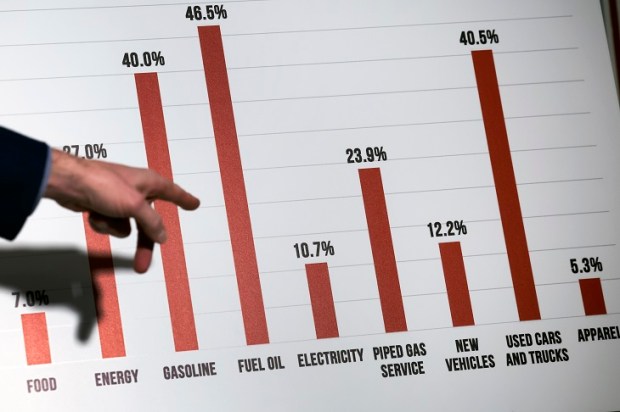Hedge fund billionaire, philanthropist, and virtual mentor to millions Ray Dalio thinks the world is going to end, and I’m inclined to agree with him.
Writing over the weekend on the debt limit, he said, ‘I think that what’s most likely to happen is that the two sides won’t allow a default […] and they won’t deal with the big issues in a substantive way. Rather, they will tweak things in ways that won’t matter much and that will look better than they really are […] I wouldn’t do that.’
Commenting on the political situation he wrote, ‘Nowadays there are three political “types” of people: the hard-right type, the hard-left type, and the bipartisan moderate type […] people will likely be increasingly forced to either pick a side and fight for it or hide by staying quiet. I’m a bipartisan moderate type who won’t hide. I believe strongly that either or both of the extreme types attempting to impose their views on others won’t work – it will just intensify the conflict, which will lead to a type of civil war.’
And: ‘Increasing the debt limit […] will mean there will be no meaningful limit on the debt. This will eventually lead to a disastrous financial collapse. Why? Because spending more than one earns and financing it with debt, which we have been doing for a long time, is easy, pleasurable, and not sustainable.’
While ‘…not increasing the debt limit will lead to default and/or a cutting back on basics for those who can’t afford cutbacks, which will cause financial havoc and social upheaval’. Sounds like we are in for a wild ride.
Dalio has a knack for breaking the global economy into its composite parts and explaining how its cogs, levers, and cause-and-effect relationships work. I started reading his work in 2018, and I remember sitting frozen in my chair, my eyes glued to my laptop, each time a chapter of his book Changing World Order hit the internet. You can see a 40-minute video summary of the book here.
Dalio’s theory is that, in economics, everything happens in cycles, beginning with a gradual and prosperous climb followed by a sudden and catastrophic crash. There are two debt cycles overlaid: the short-term cycle and the long-term cycle. The dot com boom and bust, the GFC of 2008, and the Covid crash are all examples of the ten-year short-term debt cycle, while the great depression is an example of the one-hundred-year long-term debt cycle.
These cycles are driven by those human fallibilities that predate the pyramids, fear, and greed, and they are driven by a political system that incentivises politicians to take the easy way out, like a parent distracting their screaming toddler with an iPad.
Dalio applies the long-term cycle economics concept to the rise and fall of empires, showing how leading indicators like education, competitiveness, and inventiveness stagnate when the dominant power becomes greedy, entitled, lazy, and indebted. He demonstrates how, like clockwork, the Spanish, Dutch, British, and even American empires rose and fell, first with internal conflict, then with external war.
One of the last dominoes to fall is the global reserve currency. History shows that the incredible power of the license to print the world’s money won’t be given away without war. We are now seeing the US dollar being circumvented by the Russian ruble and Chinese renminbi in the global oil markets, as Dalio predicted five years ago. The damage has already been done by many years of supping at the table of debt and prosperity, subsidised by the gradual watering down of the currency, while the incumbent power was working industriously, living frugally, and saving every penny (aided by some cheeky exchange rate manipulation boosted exports, in China’s case).
Populist leaders now have their day in the sun, pointing the finger outwards, rather than inwards, demonising the external and, more menacingly, the internal enemies – those who were smart and hardworking enough to zig when everyone else was zagging. Targetable groups are used as scapegoats by those who themselves have contributed to, or even caused, the collapse. Imagine the mandated incarceration of Millennial gamers when Bitcoin does well in the impending collapse… Some of them wouldn’t know Satoshi Nakamoto from Jeff from the Wiggles, yet one can see how they might be blamed.
A tip of the hat to those who benefit most from the system – the bankers. It would be hard for me to say I’d do it differently if I were in their shoes. Fractional reserve lending, the globally accepted standard of banks creating money from thin air (and charging interest on the air), had a way of apparently increasing the size of the pie for everyone, but no way to modulate the inevitable greed factor.
Governments do well out of the bargain. As more money is created, more can be taxed, while their debt is inflated away. Tax is done as a percentage, so the government make-off like bandits when they dip in with CGT and stamp duty on a two-million-dollar property that cost $200k twenty years ago. It’s the same piece of land, and the house is now pretty run down, yet it is worth ten times more. It now takes two over-educated professionals the better part of their lives to pay down the imaginary value of their house, while being taxed in the top tax bracket and not having any kids. They are giving sixty of the best years of their combined lives in exchange for a roof over their head, with no backyard, thanks to the subdivision they did to ‘get ahead’. They now must pay land tax, which is really ‘rent’ to the government on land that is rightfully theirs, something Cicero believed was criminal 2,000 years ago. In the government’s defence, given the pitiful improvement to absolute, let alone real wages they aren’t making much from income tax and the money must come from somewhere.
We think we are rich until we decide to sell and realise all the other houses have gone up in value. The tax man is charging a percentage-based commission, like the real estate agent. So, we trade in our two-million-dollar house for another one worth the same and pay 5.5 per cent on stamp duty. With the value increase from $200k to $2 million, the tax man has increased his transfer fee by more than ten times, while we are getting like for like, house for house. If money is a measuring device for value, our money is like a tradie using a jelly snake instead of a measuring tape – it stretches to make ends meet slowly enough that we don’t realise the four-by-two is getting shorter.
Simply put, inflating the existing currency by more than ten times doesn’t increase the amount of waterfront or inner-city land. That remains the same. The land and the number of bedrooms in the building on top of it is what we get, not the number of zeros when we sell it – that is what we get taxed on.
My dad keeps records of everything, from how many times he and my mum have watched the complete Frasier series to when he last cleaned the chimney, so I asked him to dig out some old payslips. It turns out his working hours were worth over five times more than mine at the same age for an equivalent house. Let that sink in – where he worked ten hours, I worked fifty for the same amount of house.
We are tied to the US economy, and they took modern monetary theory (MMT) to new heights of absurdity during Covid, while our best customer is China. MMT was invented by a professor from the University of Newcastle who claims that governments needn’t worry about spending less than they earn like us mere mortals. Instead, they should create money out of nothing and tootle with the interest rates lever once a month to keep unemployment in check, ignoring minor details like inflation. The Morrison and Frydenberg brains trust went against Liberal principles and bought this approach hook line and sinker. Their hands were tied, they had to switch on the money printers, or the exchange rate would have made selling rocks to the Chinese impossible. The money came in handy for bailing out the businesses they sent bankrupt locking down, and locking up, the country, even though, at that time, nobody in Australia could have caught Covid if they tried to.
It will be interesting to see what the powers that be have in mind for us as things progressively become more pear-shaped. There are signs that the US dollar will be replaced by a US central bank digital currency (CBDC). This would give governments the power to control when, where, and what you spend your money on. Call me cynical, but I doubt Americans will take to it. Florida have just banned CBDCs by law, and I wonder how other states will feel about a US dollar replacement CBDC being foisted upon them.
Any AI worth its salt would laugh at the way governments do things now. Politely stealing via endless money printing and inflation, asymmetrically under-damping the system in a way that benefits strong hands at the expense of the weak, attempting to control employment and prosperity with the lagging blunt instrument of interest rate adjustments.
Australians have no first-hand experience of recession, or worse, depression. We dodged the GFC thanks to the Howard-era sales of public companies like Telstra and a conveniently timed mining boom, while countries like Spain had 75 per cent youth unemployment. Australia has a proud tradition of fighting its way through tough situations. After all, our very existence is essentially a fight for survival atop an ancient drought-prone island full of venomous creepy crawlies. We’ll survive this too, one way or another, but the Afterpay generation doesn’t have a clue what’s coming, let alone the wealthy baby boomers. Almost nobody alive today experienced the anguish of the Great Depression or the second world war.
Dalio’s solution is getting a team of smart people from across the political spectrum to reach an agreement, while being more productive and spending less than we earn, but will we? In his words, ‘The middle needs to overtake the extremes. Do I think these things will happen? I don’t think that it is probable. The most likely path is toward there being a big clash of these forces.’
We can blame the government or postulate the evils of capitalism and/or communism, but I agree with Ray Dalio when he says that, like any machine, it isn’t personal. These basic cause-and-effect relationships have played out many times before – but not in our lifetimes, and there is very little the government, at this point, can do about it. When the dust settles after the world ends, we should think about creating a system where the Australian citizens to whom the money belongs get paid the interest when more of it is created. Buckle up.
Paul Batten is the founder of the LifeMapp app – an algorithm based routiniser, smart to-do list and goal seeker that aims to help people function in a post WW3, Industry 4.0, AI dystopia – or help avert catastrophe by individually become more meaningfully productive.

























